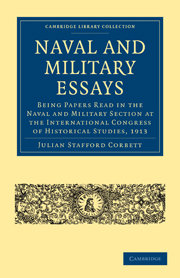 Naval and Military Essays
Naval and Military Essays Book contents
- Frontmatter
- PREFACE
- Contents
- A—NAVAL
- HISTORIANS AND NAVAL HISTORY
- STAFF HISTORIES
- NAVAL HISTORY FROM THE NAVAL OFFICER'S POINT OF VIEW
- SAMUEL PEPYS AS A NAVAL OFFICIAL
- NAVAL HISTORY AND THE NECESSITY OF A CATALOGUE OF SOURCES
- APPENDIX: ROUGH GUIDE TO BRITISH SOURCES OF NAVAL HISTORY IN THE SEVENTEENTH CENTURY
- B—MILITARY
- INDEX
NAVAL HISTORY AND THE NECESSITY OF A CATALOGUE OF SOURCES
Published online by Cambridge University Press: 07 September 2010
- Frontmatter
- PREFACE
- Contents
- A—NAVAL
- HISTORIANS AND NAVAL HISTORY
- STAFF HISTORIES
- NAVAL HISTORY FROM THE NAVAL OFFICER'S POINT OF VIEW
- SAMUEL PEPYS AS A NAVAL OFFICIAL
- NAVAL HISTORY AND THE NECESSITY OF A CATALOGUE OF SOURCES
- APPENDIX: ROUGH GUIDE TO BRITISH SOURCES OF NAVAL HISTORY IN THE SEVENTEENTH CENTURY
- B—MILITARY
- INDEX
Summary
The naval officer lives close to the elemental things of life. His ambition is to make history, not to study it. He is a profound believer in the practical, and unless history can be translated into terms of his favourite cult he will continue to regard it with indifference and suspicion. And yet, our Navy, sovereign mistress of the avenues of revictualment and reinforcement, inherits a greater history than any other nation's, and the marrow of a true doctrine lies hidden in the despatches of our great admirals; but it lies for the most part ensepulchred on dusty shelves, and the naval officer confines himself to the occasional and wholly uncritical perusal of some small text-book. From 1860 to 1900, the key-note of higher education in the Navy was a child-like faith in mathematics, with the result that, up to a few years ago, history remained the Cinderella of naval sciences. This neglect has had certain inevitable results. While unexampled attention has been given to things material and mechanical, the study of the wider aspects of strategy has been left to itself.
Great issues, mirrored in the past, rush down upon us, and their attendant problems remain unsolved because we nurse the idea that the study of our earlier struggles is useless, unproductive and out of date. History is regarded by the naval officer as a dead science. Trained in mathematics, a science which deals with quantity and ignores qualitative differences, he rarely looks beyond the horizon of technical study, and like John Roskruge, is of opinion that a sailor's ideas should go no further than the jib-boom end.
- Type
- Chapter
- Information
- Naval and Military EssaysBeing Papers read in the Naval and Military Section at the International Congress of Historical Studies, 1913, pp. 83 - 95Publisher: Cambridge University PressPrint publication year: 2009First published in: 1914


